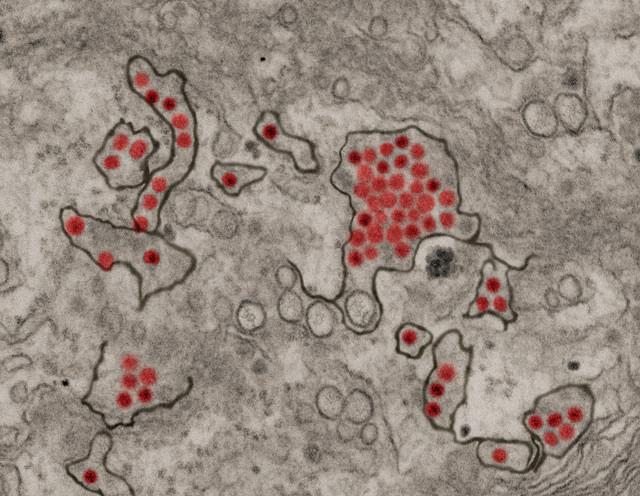
Zika virus particles (red) shown in African green monkey kidney cells. Source: NIAID
The investigational Zika purified inactivated virus (ZPIV) vaccine was well-tolerated and induced an immune response in participants, according to initial results from three Phase 1 clinical trials. Scientists at the Walter Reed Army Institute of Research (WRAIR), part of the U.S. Department of Defense, are developing the vaccine as well as leading one of the trials. WRAIR also is co-funding the trials together with the National Institute of Allergy and Infectious Diseases (NIAID), part of the National Institutes of Health (NIH). The results will appear on Dec. 4 in The Lancet.
“A vaccine is urgently needed to help prevent Zika infection, which can cause birth defects and other developmental abnormalities in babies born to infected women, as well as a constellation of other health problems in infected adults and children,” says NIAID Director Anthony S. Fauci, M.D. “We are encouraged by initial clinical trial results that indicate the ZPIV vaccine is safe and immunogenic, data that support additional clinical testing of the vaccine to determine its ability to prevent Zika virus infection.”
The ZPIV vaccine candidate contains whole Zika virus particles that have been inactivated and therefore cannot replicate and cause disease in humans. However, because the protein shell of the inactivated virus remains intact, it can be recognized by the immune system.
Of the 67 adult participants in the initial studies, 55 received the investigational vaccine and 12 received a placebo. The investigational vaccine was administered with an adjuvant (a compound that helps induce a stronger immune response) containing aluminum salts. All participants received two intramuscular injections of the same dose four weeks apart. The trial was double-blinded, meaning neither the investigators nor the participants knew who received a placebo.
Investigators tested participants’ blood samples periodically and detected antibodies to Zika virus in more than 90 percent of individuals who received the experimental vaccine, within four weeks after the last dose.
While Zika experts have not precisely determined the concentration of antibodies needed to protect against congenital infection, animal model studies are helping to provide useful insights. Researchers investigated the possible mechanism of vaccine protection by transferring the vaccinated participants’ antibodies into mice and then purposely infecting the mice with Zika virus. Results indicate the antibodies provided robust protection against Zika viremia (detectable virus in the blood).
“Zika remains a threat to U.S. military personnel and families of service members. We aim to develop a vaccine to protect the military, as well as the global community,” said Col. Nelson Michael, Zika program leader at the Walter Reed Army Institute of Research.




